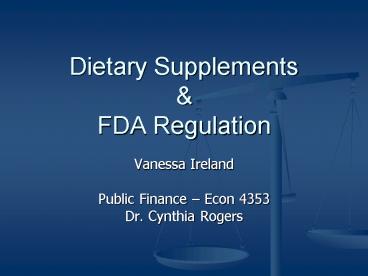Dietary Supplements - PowerPoint PPT Presentation
1 / 19
Title:
Dietary Supplements
Description:
... policy preserves the consumer's freedom to choose dietary supplements without ... Available: http://www.fda.gov/bbs/topics/NEWS/dietarysupp/factsheet.html. ... – PowerPoint PPT presentation
Number of Views:1173
Avg rating:3.0/5.0
Title: Dietary Supplements
1
Dietary SupplementsFDA Regulation
- Vanessa Ireland
- Public Finance Econ 4353
- Dr. Cynthia Rogers
2
Dietary Supplements
- A dietary supplement is defined by the FDA as a
product taken by mouth that contains a dietary
ingredient intended to supplement the diet. (FDA
Website, 2003) - The "dietary ingredients" in these products may
include vitamins, minerals, herbs or other
botanicals, amino acids, and substances such as
enzymes, organ tissues, glandulars, and
metabolites.
3
Dietary Supplements
- Dietary supplements are placed in the category of
foods, not drugs, and requires that every
supplement be labeled a dietary supplement. - Dietary supplements are not required to undergo
scientific testing and do not have to seek
approval from the FDA prior to marketing
products.
Food and Drug Administration Center for Food
Safety and Applied Nutrition. An Overview of
Dietary Supplements On-Line. Available
http//www.cfsan.fda.gov/dms/ds-oview.htmlwhat.
Accessed November 1, 2003.
4
Dietary Supplement Health Education Act (DSHEA)
of 1994
- Does not require that dietary supplements be
shown to be safe or effective before they are
marketed - The agency is permitted to restrict a substance
if it poses a significant and unreasonable risk
under the conditions of use on the label or as
commonly consumed.
5
Current Regulation Under DSHEA
- Dietary supplements should not make health claims
without evidence and without FDA approval. - Should not make disease or health claims.
- Dietary supplements can make claims that
supplement affects the structure or function of
the body.
6
DSHEA Policy Justification
- This policy preserves the consumers freedom to
choose dietary supplements without a prescription
and at a reasonable cost.
Dietary Supplements. Center for Food Safety and
Applied Nutrition. Food and Drug Administration
On-line. Available http//www.cfsan.fda.gov/dm
s/supplment.html. Accessed October 25,2003.
7
Economic Aspects
- Market Efficiency
- Private Decision Rule
- Rent Seeking
- PACs and Special Interest Groups
- Externalities
- Efficiency Rule
8
Externalities of Dietary Supplements
- Fraud
- Contamination
- Health risks such as heart attacks, strokes, and
even death
Cohen, M. (2003). Complementary and Integrative
Medical Therapies, the FDA, and the NIH
Definitions and Regulation. Dermatologic Therapy,
16 (2), 77-84.
9
Market Efficiency
- MBP MCP
- MCP P E(Risk)
- MCPTrue P True Risk
- True Risk E(Risk)
- Mislabeling
- Ignorance
- False claims by manufacturers
10
Implication of Risk Assessment
- MCPTRUE MCP
- MBP
11
Special Interest Groups
- PACs such as The National Nutritional Foods
Association (NNFA) represents the interests of
manufacturers and retailers of a wide variety of
natural products including sports nutrition
products and vitamins, herbs and other dietary
supplements.
NNFA. The National Nutritional Foods association.
On-line Available http//www.nnfa.org/index.htm
. Accessed Nov. 23, 2003.
12
Welfare Costs of Rent Seeking
- Rent seekers compete to get the government to
minimize regulations to avoid increased prices. - PACs such as the NNFA will use resources to gain
the benefit of minimum regulation and increase
the total welfare cost to society.
13
Externality of Dietary Supplements
Private Decision Rule
14
Proposed Labeling and Manufacturing Standards
- Recently the FDA has come under increasing
pressure to establish new standards to help
reduce risks associated with dietary supplements
by imposing industry wide standards to ensure
that dietary supplements are manufactured
consistently as to identity, purity, quality,
strength, and composition.
15
Criteria
- Minimum Standards would include
- Requirements on the design and construction of
physical plants for quality control procedures
and product testing to prevent super or sub
potency, wrong ingredients, contaminants,
improper packaging, and mislabeling.
- The proposed regulations would apply to both
domestic firms and foreign firms that
manufacture, package, or hold dietary ingredients
and dietary supplements for distribution into the
U.S.
FDA. FDA Proposes Labeling and Manufacturing
Standards Dietary Supplements On-line.
Available http//www.fda.gov/bbs/topics/NEWS/diet
arysupp/factsheet.html. Accessed Nov. 26, 2003.
16
Proposed Standards Acting as a Corrective Tax
17
Explanation of Corrective Tax
- The proposed standards by the FDA forces the
manufacturers to undertake the extra effort or
care that matches the customers desire to avoid
the risk of harm. - These proposed standards will act as a corrective
tax by internalizing externalities. - E(Risk) True Risk
18
Recommendations
- In addition to the FDA implementing the proposed
standards, the FDA could also - Assess fines to manufacturers who violate quality
control regulations. - Use tax revenue to fund scientific testing on
supplements that have adverse effects. - Give a tax deduction to manufacturers who do
their own unbiased scientific testing and receive
approval from the FDA prior to marketing products.
19
Conclusion
- By implementing the recommendations
- Uncertainty regarding the risk of dietary
supplements will decrease. - Quality and safety of dietary supplements will
increase and total welfare cost to society will
decrease. - Welfare cost of rent seeking will decrease.































